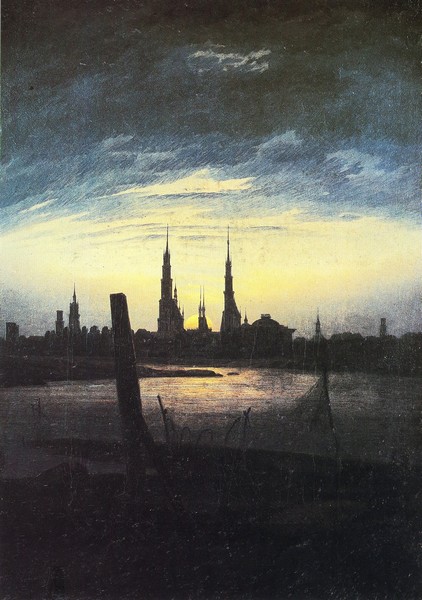
When people talk about what Franz Grillparzer called Schubert's "fairer hopes", that music he couldn’t write, we usually refer to the modernity of some of the works he wrote during his last year, such as the three piano sonatas or Heine's songs. We could add some other ones written before which anticipate some decades other composers such as Richard Wagner; for example, two Lieder that we haven't heard yet, Dass sie hier gewesen and Auflösung. But Die Stadt is a modern work in a much wider sense; In his notes to the Hyperion Schubert Edition, Graham Johnson says that "the music is so minimalist here that it might almost be an aria from an imagined John Adams opera entitled Heine in Hamburg" (I wish Adams would write that opera!). That's, in my opinion, the key of Die Stadt: its modernity almost two hundred years later.
Somehow, the same could be said about the six lieder that Schubert composed from poems by Heine, all different in their originality. Not long ago, I told you about one of them, Der Doppelgänger, and I told you that, in that song, Schubert anticipated Hugo Wolf more than sixty years. Der Doppelgänger and Die Stadt share the subject, grieving a breakup (in fact, absence is one of the constant motifs of Schwanengesang) and are both concise, economical songs. In Die Stadt, Heine turns his attention to the outside, towards the city. A city that rejects him (in fact it is a woman who rejects him, but that's how projections work). It’s also an industrial city, very different from the Vienna Schubert knew (we shouldn't forget that Schubert and Heine were the same age, and the poem was published in 1826).
The piano, I'm so sorry singers, draws all the attention; Because of both, the obsessive octaves in the left hand and the disturbing arpeggio in the right hand, which also becomes obsessive after listening to it again and again. We hear them in the prelude; Then, in the second stanza, when we're set on the boat (is it that cold and humid wind hitting our face and making us shudder?); and again, at the end. They are repeated so many times (we hear those arpeggios seventeen times!) that stay in our mind for a long time. The voice virtually sings a recitative in the first stanza, marked as leise (soft) in contrast to stark (ould) in the third, the two stanzas having a similar form; the voice only has some motion in the second stanza, that's to say, on the boat. All in all, it's a song as freezing and oppressive as so many in Winterreise.
I waited for two weeks before talking again about Die Stadt because it will be one of the Lieder to be performed by baritone Samuel Hasselhorn and pianist Renate Rohlfing next Wednesday, 20 December, in the second recital of the Schubert Lied series. They've put together a wonderful program, including seven of the Schwanengensang's Lieder; Here you are the links to the songs we've heard so far, just in case you want to go over them:
Am fernen Horizonte
Erscheint, wie ein Nebelbild,
Die Stadt mit ihren Thürmen,
In Abenddämmrung gehüllt.
Ein feuchter Windzug kräuselt
Die graue Wasserbahn;
Mit traurigem Tacte rudert
Der Schiffer in meinem Kahn.
Die Sonne hebt sich noch einmal
Leuchtend vom Boden empor,
Und zeigt mir jene Stelle,
Wo ich das Liebste verlor.
Upon the far Horizon
Like a picture of the mist,
Appears the towered city
By the twilight shadows kissed.
The moist soft breezes ripple
Our boat's wake grey and dark,
With mournful measured cadence
The boatman rows my bark.
The sun from clouds outshining,
Lights up once more the coast;
The very spot it shows me
Where she I loved was lost.
(translation by 'Emma Lazarus)














Comments powered by CComment